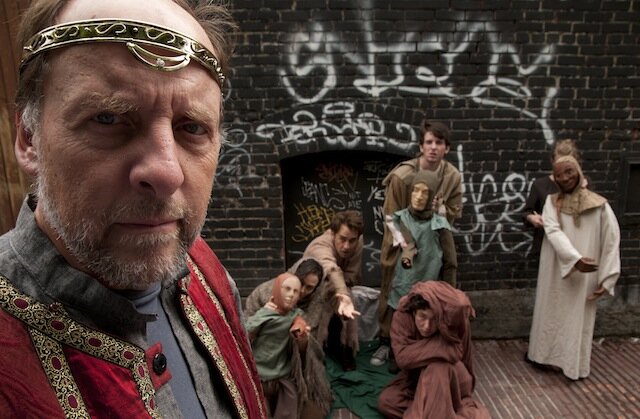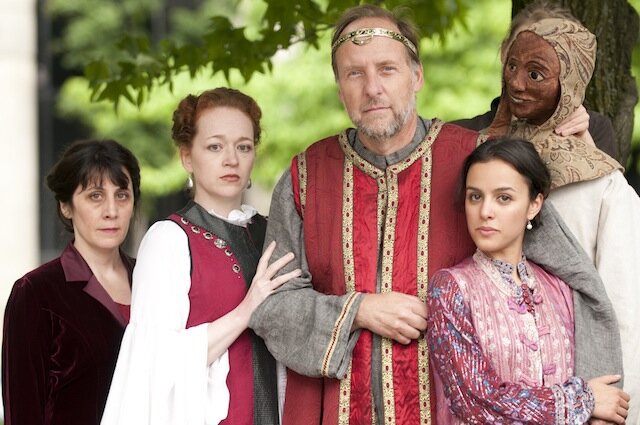Special to The SunBreak by Danielle Girard
“Underneath my shirt is my skin, underneath my skin is my heart, underneath my heart is…” Fill in the blank.
Freehold Theatre’s Artistic Director Robin Lynn Smith has a vision: using Shakespeare to help underserved populations and non-traditional audiences finish that sentence and fill in the blank. Or at least begin exploring what may lie in the silence of the unanswered question.
Since 2003, Smith has directed Freehold’s Engaged Theatre program which tours Shakespeare productions to prisons, projects, and juvenile detention centers. This July, Smith and her team of actors—many of whom have participated in previous tours—will perform King Lear for both the general Seattle public as well as communities in non-traditional sites across the greater Puget Sound area from July 1 to 15.
What exactly inspires these artists to return each year and perform for such unique audiences? For Smith, it’s about the power of communion between the performers and these enthusiastic audience members. “We are privileged to perform for our extraordinary audiences and have been amazed by what we continue to learn about art, humanity, identity, existence, diversity, compassion, and community,” she says.
She explains that the men and women of these centers attend performances by choice and often actively engage with the show. They laugh, talk back, and advise characters. The inmates expect an honest and committed performance, so actors have to give it all they’ve got. Smith emphasizes that it is an exciting risk for performers: “You have to go out there and say trust us. And if we lie, they’re not going to stay. They’re not going to be polite and sit with their junior mints. So we have to say, we’re here with you.”
This year the tour will perform for the general public as well as for a number of underserved populations including Joint Base/Lewis McChord, Washington Corrections Center for Women, Monroe Correctional Center for Men, Harborview Medical Center and Echo Glen Children’s Center, a juvenile detention center.
At each non-traditional site, Freehold has one hour and fifty minutes to perform Lear without a traditional stage or lights. So how then do they evoke the world of the play? Smith says live music is crucial in creating Lear’s world and atmosphere. (This year’s live musical accompaniment was composed by Gino Yevdjevich of the local Seattle gypsy punk band Kultur Shock.)
She adds that employing big physical imagery also helps illuminate Shakespeare’s words, none of which are paraphrased or rewritten, for the audience. Oh: Did we mention that many of the lead characters are played by life-size puppets?
Actor Jose J. Gonzales, who plays Edmund in this production of Lear, traveled with other cast members in January to perform scenes from the play in a workshop at the Washington Corrections Center for Women and the Monroe Correctional Center for Men. “I love the whole process and how it culminates in going out to these communities,” says Gonzales. “For me it’s more meaningful than traditional theatre.”
Performances are often followed by the opportunity for performers and audience members to engage in in theatre and writing exercises together. Gonzales recalls a young inmate from the Monroe workshop in January who–when given the prompt, “Underneath my shirt is my skin, underneath my skin is my heart, underneath my heart is …” and asked to continue writing for 15 minutes–eventually jotted, “One day I look up at the sky it’s blue, and the next day I look up and it’s cloudy. Why is that?”
Gonzales admits, “There’s something about that sentiment that just tore me up. You can see his struggling with the question of ‘Why is this existence like it is? Why am I here? How did this happen?’”
This can sound a lot like the questions and themes Shakespeare explores in King Lear. Maybe Lear says it best himself:
…we came crying hither:
Though know’st, the first time that we smell the air
We wawl and cry…
When we are born, we cry that we are come.
Smith drove home this parallel when explaining why she chose to tour King Lear this year. “I am inspired by the human struggle to know ourselves, and the attempt to look fiercely at the truth of our existence–framed by limits of isolation, separateness, bewilderment, blindness; and the limits of our time here: aging and death. And it’s a great story.”
She also mentioned that Shakespeare’s themes of forgiveness, redemption, and revenge often strike a chord with their non-traditional audiences, in addition to the extreme situations each character faces.
“It’s crazy how fiction can—and the characters more to the point—who are beautiful, amazing, flawed, noble, messed up, and scared (all of those things that we all are as human beings) can be something that someone can really take on or identify with,” says Smith.
The King Lear tour kicks off with a Seattle preview on July 2, travels to non-traditional sites, and then returns to the city for final performances July 12 to 15. The show itself is free. As Smith explains, “We made it by donation everywhere we go. And that’s very much on purpose. We’re saying, come participate with us. To me that’s part of the vision of this work—it’s really inviting anybody and everybody that wants to come in, to come in, and that includes the Seattle audience.”
The cast includes: Eric Ray Anderson, Christine Brown, Erwin Galan, Jose J. Gonzales, Sarah Harlett, Joshua Holguin, Reginald Andre Jackson, Robert Keene, Shanelle Leonard, Kevin McKeon, Andre Nelson, Anthony Pasqualini, Luisa de Paula, Jesse Sherfey-Hinds, Annette Toutonghi, and Kayla Walker.
Free Public performances of King Lear
July 2, 6:30 p.m., Seward Park, Amphitheatre
5898 Lake Washington Blvd. S., Seattle
July 12, 13, 14, at 8 p.m.; July 15, 4 p.m.; Seattle University Lee Center for the Arts
901 12th Avenue, Seattle
Tickets are free but reservations are requested.



